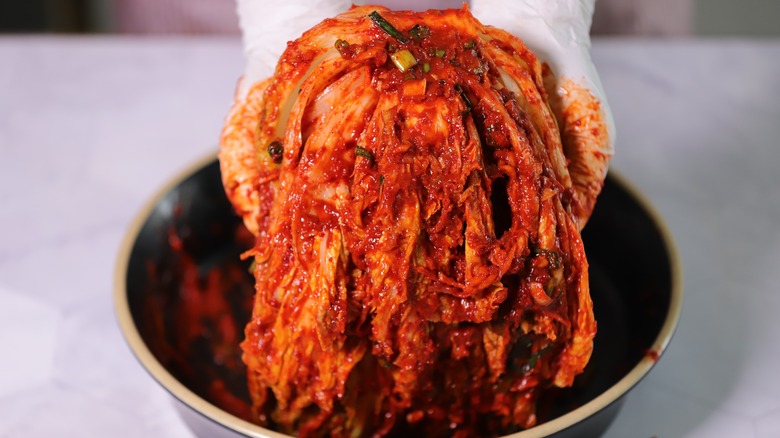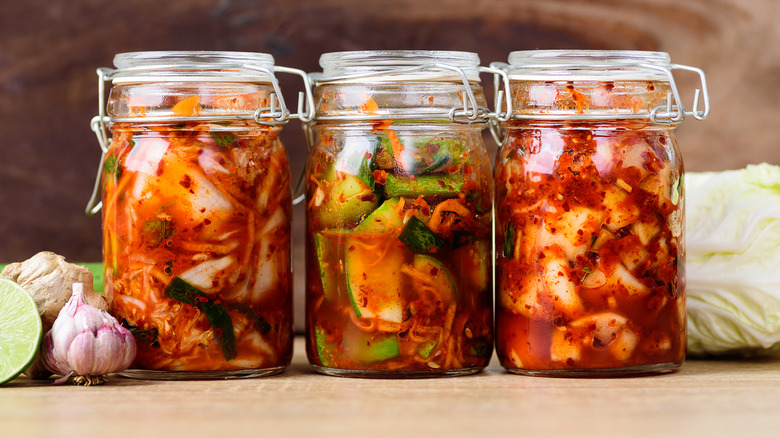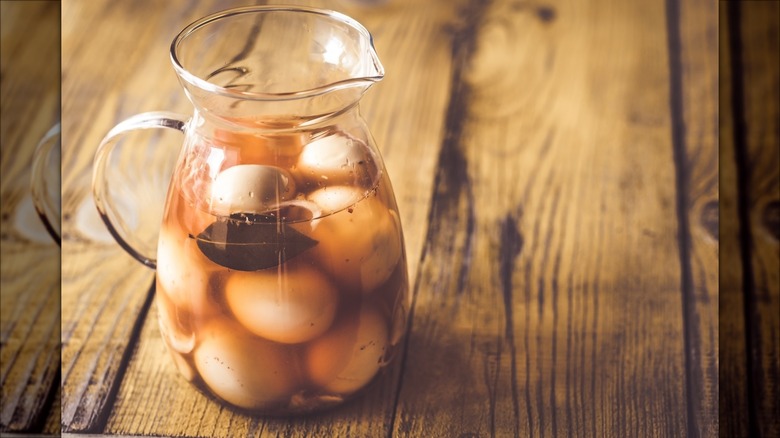Pickle Your Eggs In Kimchi For A Serious Upgrade
Transforming a simple ingredient into something crisp and delicious is what makes pickling such a delightful craft. Take, for instance, the classic pickled egg, made with hard boiled eggs steeped in a simple brine of vinegar, sugar, salt, and perhaps a hint of beet for color. While the traditional way of making this snack yields a tasty and tangy result, it tends to be very vinegar forward, often lacking depth of flavor.
That's where kimchi, the spicy, cabbage-based Korean condiment, can come to the rescue. Its brine, a flavor-packed combination of ingredients like ginger, red pepper flakes, scallions, fish sauce, and sometimes fruit, can easily elevate your pickled eggs in a unique way. In addition to the taste of the eggs, each bite will be bursting with tanginess, heat, sweetness, and even savory umami from the fish sauce. If you like kimchi and wouldn't mind your pickled eggs having a bit more kick and complexity, you'll definitely want to consider trying this unique twist.
Kimchi pickled eggs vs fermented eggs
To infuse pickled eggs with the flavors of kimchi, one approach is to use the leftover kimchi brine straight from the jar along with some kimchi, and add more vinegar to it to fully submerge the eggs. Alternatively, if you need to skip the vinegar, you can nestle the hard-boiled eggs along with the other kimchi ingredients to make kimchi.
While both these methods yield delicious, similar-tasting results in as little as two days, it's essential to note that the latter technically produces fermented rather than pickled eggs. This is because there is no vinegar present. Instead, this process relies on the natural lactobacillus bacteria present in ingredients like cabbage to produce lactic acid, imparting that signature tanginess over time. While fermented eggs maintain a pickled taste, they also develop a fizziness that is present in other fermented foods such as kombucha.
Both methods serve to upgrade traditional pickled eggs with kimchi, but keep in mind that fermented eggs are best enjoyed within a shorter timeframe of roughly two weeks. When vinegar is involved, your kimchi pickled eggs boast a longer shelf life of about four months.
What's the best type of kimchi for pickling eggs?
When it comes to selecting the best variety of kimchi for pickling eggs, it ultimately depends on your personal taste preferences and desired flavor profile. Traditional napa cabbage kimchi is a reliable choice, of course, but if you want your pickled eggs to have sweet notes, for example, you may want to opt for radish water kimchi, which features Korean pear juice; you could also add applesauce to make your kimchi stand out, or whip up some hearts of palm kimchi. Prefer to keep your pickled eggs mild? White kimchi is your best bet, with its flavorful blend of radishes, garlic, chives, jujube fruit, pear, and even chestnuts — minus the heat from hot pepper flakes.
While the kimchi's ingredients are important, let's not forget about the eggs themselves. Just like when you make traditional pickled eggs, better quality eggs mean better-tasting pickled eggs. For best results, go with small or medium-sized eggs, as their size allows the kimchi seasoning to penetrate the membrane more effectively, leaving you with the tastiest possible pickled eggs.


